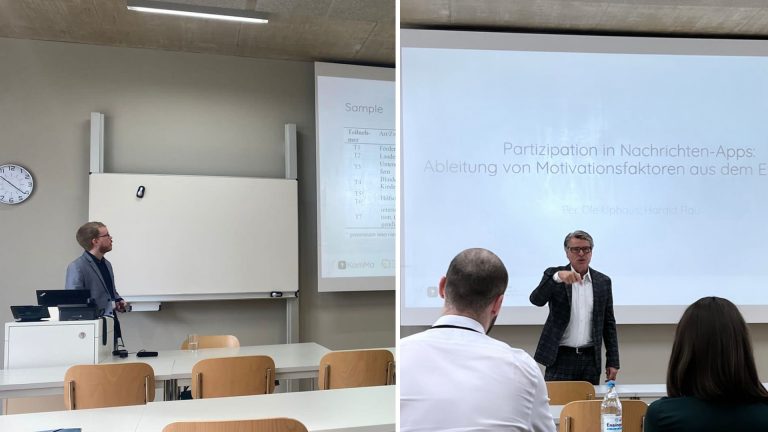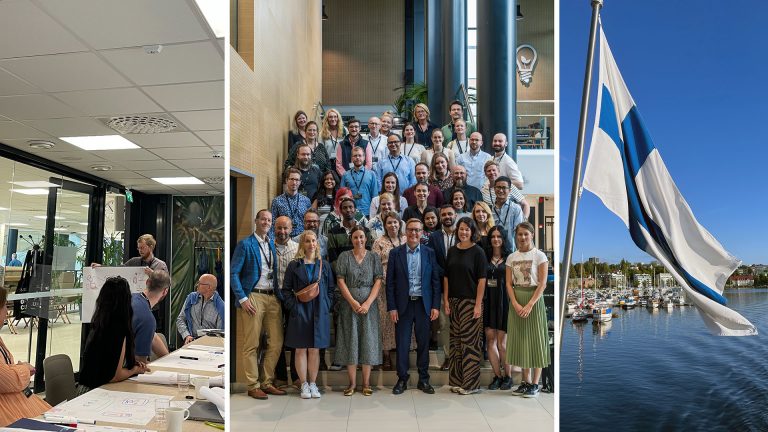
Professur für Kommunikationsmanagement
Herzlich Willkommen beim KomMa-Team der Ostfalia Hochschule für angewandte Wissenschaften in Salzgitter.
Team
Das Markenzeichen von KomMa: ein breit gefächertes Kompetenzprofil in Kommunikationswissenschaft, Medienwirtschaft, Journalistik, strategischer und politischer Kommunikation.
Studium
Wir lehren mit systemisch-konstruktivistischem Ansatz und verstehen uns selbst als lebenslang Lernende, die Menschen gerne, mit Leidenschaft und Nähe bei der Entdeckung ihrer Talente begleiten.
Projekte
International gut vernetzt suchen wir mit unseren Lehr- und Forschungsprojekten theoriegeleitet und empirisch unterfüttert Erkenntnisse, die Medienökonomie und Medienpolitik nachhaltig bereichern.
Neuigkeiten
Lehre, Forschung und Persönliches: Neues aus dem KomMa-Team
Kommunikationsmanagement
Was bedeutet eigentlich Kommunikationsmanagement?
Vielleicht fragen Sie sich, warum es hier um Kommunikationsmanagement geht. Schließlich wird in der Wissenschaft dieser Begriff zumeist auf die strategische Kommunikation begrenzt, allein mit seiner Nähe zu den Public Relations begründet. Das KomMa-Team sieht sich jedoch einem weiten Begriff verpflichtet, bei dem der Bestandteil „Kommunikation“ ebenso einen Aspekt der Koordination enthält wie der Begriffsbestandteil „Management“. Man könnte Kommunikationsmanagement (pleonastisch) also als Koordinationskoordination bezeichnen. Das trifft sogar den Nagel auf den Kopf! Die beiden Koordinationsaspekte aber besitzen unterschiedliche Tragweite und eine jeweils spezifische Ausprägung. Genau deshalb finden wir es so passend, von Kommunikationsmanagement zu sprechen, wenn wir die gesellschaftlichen Dimensionen von Kommunikationsprozessen betrachten. Genau deshalb auch ist das KomMa-Team so breit aufgestellt, integrieren wir so viele Aspekte, Schwerpunkte und Talente.
Publikationen
In der folgenden Liste finden Sie unsere wissenschaftlichen Publikationen
erschienen in Monographien, Zeitschriften und Konferenzbänden.
2023 |
Uphaus, Per Ole; Rau, Harald Predicaments in social innovation research: The need for methodological flexibility due to (previously) intangible topics. Konferenz 2023 IEEE International Symposium on Technology and Society (ISTAS), Online, 2023. @conference{nokey, |
Rau, Harald; Uphaus, Per Ole User participation in location-based news apps: deriving motivation factors from volunteer work. Participation and the Postdigital: Contemporary technologies and practices in education and urban life Konferenz Braunschweig, 2023. @conference{nokey, |
Uphaus, Per Ole; Rau, Harald Innovations in Local Communication: research on LBS and its implications for news media. Konferenz Locating Media Industries: Cities, Spaces, Places, London, 2023. @conference{nokey, |
Steinbock, Karoline; Gülle, Nico; Bahrke, Maja; Rau, Harald; Uphaus, Per Ole Users in Their Twenties and the Usage, Judgement and Ideas for Media Libraries of Public Service Broadcasters (PSB): A Three-step Case Study on the ARD media library Konferenz Annual Conference of the European Media Management Association (emma), Pamplona, 2023. @conference{nokey, |
Nowak, Naomi; Rau, Harald Managing volunteers in Citizen Broadcasting – a Blind Spot in Media Management. Konferenz Annual Conference of the European Media Management Association (emma), Pamplona, 2023. @conference{nokey, |
Uphaus, Per Ole; Rau, Harald Limitations in Media Management Research Concerning Innovations. Konferenz Annual Conference of the European Media Management Association (emma), Pamplona, 2023. @conference{nokey, |
Uphaus, Per Ole; Rau, Harald Motivating factors for participation in (location-based) news apps: Learning from volunteer work. Konferenz Annual Conference of the European Media Management Association (emma) , Pamplona, 2023. @conference{nokey, |
2022 |
Rau, Harald Managing Innovations in Content Driven Media – Limitations and Challenges for Research: the Case of Location-based Services Konferenz Porto, 2022. @conference{Rau2022, |
Rau, Harald In: Krone, Jan; Pellegrino, Tassilo (Hrsg.): Handbook of Media and Communication Economics: A European Perspective, Springer, 2022. @inbook{nokey, |
Rau, Harald; Bahrke, Maja; Uphaus, Per Ole Methodenaustausch – Das (Studio-)Interview: Wie Video-Aufzeichnung das Sprechverhalten verändert Vortrag Ostfalia Hochschule für angewandte Wissenschaften, Salzgitter, 12.08.2022. @misc{nokey, |



